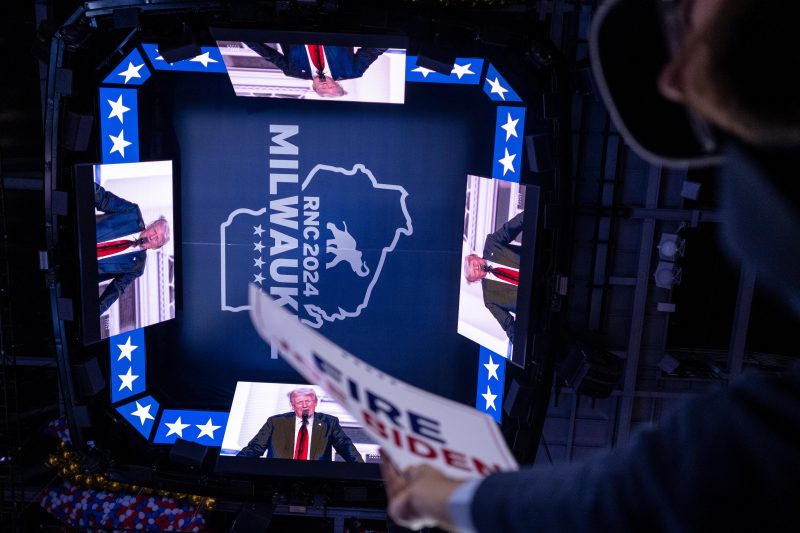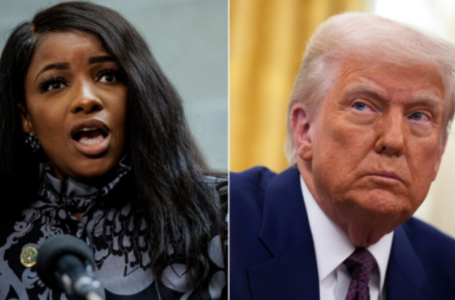Trump’s tariffs could plunge Mexico and Canada into a recession
A month that upended the campaign leaves Trump in his strongest position yet


MILWAUKEE — As Republicans break camp at the conclusion of their national convention, the presidential campaign has taken a turn that no Hollywood scriptwriter would have dared imagine, opening a cavernous gap in moods inside the two major parties. Suddenly, Republicans are as sky-high and confident as Democrats are down and discouraged.
Within the past month, cascading events have changed the dynamic and possibly the ultimate trajectory of the election. Leaving his convention, former president Donald Trump is in a stronger position politically than at any point in the campaign, or for that matter in any of the three campaigns he has run since he was first a candidate in 2016.
Meanwhile, many Democrats despair that President Biden could lead them to a broad defeat that could leave the White House, House and Senate in Republican control. But they also worry that, even if the president yields to calls to step aside, a possible replacement, whether Vice President Harris or one of several governors talked about as possible candidates, would carry significant risks as well.
This campaign has long been something of a contradiction: static but potentially volatile. It has had stability as seen in most national and many swing-state polls. While those polls have shown Trump with a narrow advantage over Biden, the margins have been small and relatively stable — until now.
Despite that, the campaign has always had an element of instability due to a sour electorate, with voters broadly unhappy about their choice of candidates, which leaves questions about how many will actually vote. Then there’s the potential impact of unpredictable events and known unknowns. The past month has brought that part of the campaign to the forefront.
This cycle of events began with the disastrous June 27 debate performance by Biden. Next came the Supreme Court’s ruling that presidents have immunity from prosecution for official acts, a victory for Trump that probably assures that he will not face trial before the election in the federal case that brought charges for his role in the Jan. 6, 2021, attack on the U.S. Capitol.
Last Saturday came the shocking assassination attempt against Trump and his clenched-fist response as he was led offstage, bloodied, by Secret Service agents. On Monday, a federal judge in Florida dismissed charges related to his handling of classified documents. And starting later that day, Republicans produced a convention here in Milwaukee that highlighted a party that has been reshaped in Trump’s image and with delegates fully united behind their nominee.
The contrast between the state of the parties at midsummer was sharpened further this week with reports of Democratic disunity. Senior Democratic leaders — Senate Majority Leader Charles E. Schumer (N.Y.), House Minority Leader Hakeem Jeffries (N.Y.), former House speaker Nancy Pelosi (Calif.) — had warned Biden that he could take down his whole party by staying in the race. And then, on Wednesday, came the news that Biden had been diagnosed with covid-19, forcing him off the campaign trail.
Judgments about the two candidates and the current state of the race are telling.
“If the Democrats persist in nominating Joe Biden, at this point they’re essentially conceding the presidency to Donald Trump,” Republican pollster Whit Ayres said. “Trump waving his fist in the face of an assassin is the very picture of strength. You put that alongside Joe Biden’s vacant stare during the debate and he is the very picture of weakness.”
A Democrat who spoke on the condition of anonymity to provide a candid assessment of the state of the campaign offered a similar if less harsh view. Republicans today, this strategist said, remind him of Democrats in 2008 when Barack Obama was running his first campaign. Republicans, he said, are “psyched, 100 percent behind their guy … and they think they’re going to win.”
Democrats need a shot in the arm, he added, “to reset and get that feeling back. That means getting a new nominee, any nominee.” If that happens, he said, “I think we will be excited and get absolutely pumped up and feel we can be competitive again.”
Still, however good the past few weeks have been for Trump or bad for Biden, the basic contours of this election haven’t entirely disappeared. Trump, for all his current strengths, remains a candidate with flaws and vulnerabilities.
The average of national polls now gives Trump a lead of between two and three percentage points, representing a small shift in his direction since the June 27 CNN debate in Atlanta. A CBS/YouGov poll released Thursday showed Trump at 52 percent, Biden at 47 percent, Trump’s largest lead of the campaign. A July 3 poll showed Trump at 50 percent, Biden at 48 percent.
Electoral college projections, based only in part on polling, show a deteriorating map for Biden, with states such as Virginia, New Hampshire and Minnesota that the president won in 2020 and counted as almost certainly in his column now seen as potentially competitive, though more evidence is needed to make a fuller assessment.
Biden has been dismissive of the public polls and of reports that some private polls show movement in Trump’s direction. His campaign continues to say it sees a path to victory, one that runs through Michigan, Pennsylvania and Wisconsin. Winning those three states would put Biden at 270 electoral votes, the minimum needed, which includes a single vote from one of Nebraska’s congressional districts. The Post’s average of polls shows Wisconsin tied, Trump with a lead of less than a percentage point in Pennsylvania and Trump with a lead of three points in Michigan.
The final months will be focused on two overriding questions. The most immediate is whether Biden decides to step aside. The Democratic National Convention is now a month away, which leaves limited time for the party to find another candidate and to unify around that person if Biden decides to end his candidacy.
Party officials are starting to put in place the mechanisms for an early virtual roll call of delegates that could take place in early August — before delegates arrive in Chicago. That virtual roll call, seen by party leaders as necessary to ensure that their nominee qualifies for all state ballots, could be used to nominate Biden — or a possible successor. If Biden is not a candidate by then, the party will face the choice of open competition or a quick consolidation around Harris.
The second question is whether, after a generally successful convention, Trump reverts to past practices and behavior — as a candidate given to wild claims, grievances, lies about the 2020 election being stolen and sometimes rambling discourse that can put a focus on the fact that he is, at 78, only a few years younger than Biden.
His Thursday night acceptance speech, a lengthy and often meandering address, included touches that his advisers hoped to see, such as pledges to unify the country. His description of the assassination attempt was moving, and to many in the audience emotional. But his speech contained many more flashes of the Trump the country had long ago come to know.
When he got to the issues, including immigration, the speech included oft-used distortions and falsehoods repeated from the campaign trail. He also made some extravagant promises, from claiming he will “end every single international crisis that the current administration has created,” to an assertion that “incomes … will skyrocket” if he is elected.
With so much focus on Biden’s debate performance and the turmoil within the Democratic Party about his future as a candidate, Trump has enjoyed a month with little scrutiny. The assassination attempt brought him sympathy and admiration in the eyes of many voters. His convention amounted to a four-night infomercial for the candidate and nightly criticism of Biden’s record on inflation, immigration and national security.
Republican strategists argue that the smartest course for Trump from here is to be steady rather than provocative, calm rather than inflammatory, a steady-as-you-go campaign that keeps attention on Biden’s record and avoids unforced errors. But Trump is nothing if not predictable. He has never before exhibited such sustained restraint and message discipline, and his record remains the single most powerful motivator for Democratic voters to turn out in November.
Democrats will have their own convention to prosecute the case against Trump, and they have been preparing for months. The Biden campaign has sought to elevate Project 2025, the conservative Heritage Foundation’s controversial policy blueprint for a second Trump term. Trump has tried to distance himself from the project, even though many who served in his first administration and are seen as likely candidates for a future second one have been instrumental in its drafting.
The turmoil surrounding Biden’s candidacy comes at a time when the candidate and his party should be putting the final touches on their own convention and making the case against Trump. Instead, they are caught up in an unprecedented internal debate that is costing them time, energy and unity. What they will need is not just unity but enthusiasm that can produce the high levels of voter turnout that brought victories in 2018 and 2020, and that turned back the anticipated Republican wave in 2022.
Trump can expect some gains from his convention, but if history is a guide, those can fade. At some point, after the Democratic convention, the campaign should settle back into familiar patterns, with two nominees and two parties locked in competition for the White House.
When that happens, the question will be whether Democrats will be able to rebound from what has become a low point in the campaign and make the contest as competitive as was predicted when it began.











